- Vash continued to be a likeable character - a Columbo-esque bumbling gunman - though towards the end of the series he takes on a more whiney emo style. I found this somewhat annoying, especially since the series kept covering the same thematic ground (there is one particularly tragic moment in the 24th episode where this could be appropriate, but even then, they overdo it).
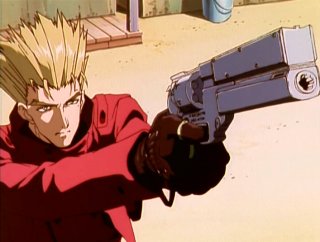
- The tone of the series continued to vary wildly from a silly, practically slapstick comedy to a stoic and deadly serious drama to madcap action sequences. For the first 15 or so episodes, the emphasis was pretty firmly in the slapstick realm, while things got progressively more serious and darker as the series ended. As you might expect, the exaggerated and stylized expressions continued to appear, though their frequency decreased as the series progressed (i.e. as the series got darker). The series also strays a bit from its steampunk Western roots and incorporates more and more science fiction into the mix. However, I found much of the SF presented to be just as problematic as the steampunk elements in that I found myself getting caught up in the minute details and missing the forest for the trees.
- The series definitely contains too much filler, and could easily have been fit into 13 episodes. Indeed, the person I had identified as the primary villain in the previous entry isn't actually the primary villain. You don't find out who that is until the 16th episode in the series. Minor spoilers, the main villain is Vash's brother. It turns out that Vash and his brother Knives are not human, though it's not clear what they are or where they came from. They seem to me to be genetically altered humans or something, and the flashbacks make it clear that they are superior to humanity in several ways. Vash seems to take this to heart and loves humanity (as he is taught by his primary caretaker, Rem), while Knives seeks to destroy the inferior race... though I'm a little unclear on why he wants to do this. Such villainy is difficult to understand, and the series never quite establishes the real motives behind Knives' compulsions.
- There are a couple of flashback episodes, but the series still generally conformed to 1 or 2 episode arcs with a video game style boss-battle at the end of each arc.
- The animation remained poor, with continued overuse of the single cell panning technique described in my first post.
The ending makes a certain thematic sense, but I found the execution be somewhat dull and anticlimactic. It was pretty obvious what was going to happen - it's not like the theme hadn't already been established over and over again throughout the series. I suppose there is an element of ambiguity in the ending, but I have to say that I'm not particularly interested in exploring various interpretations.
So this is the first series I've watched and pretty thoroughly disliked. It had its moments, and for a good portion of the series, it was watcheable, but something didn't really jive with me. In the comments to my last post, I said:
I have a hard time articulating what it is that I don't like about this series. Everything I come up with seems like a nitpick or a rationalization. Nitpicking is almost always symptomatic of a deeper distaste for something, I just haven't really figured out what that is. It might be the tonal schizophrenia, but then, I don't mind huge shifts in tone in other things. Indeed, watching a movie like From Dusk Till Dawn, the best thing about it is the tonal shift (IMHBCO). Perhaps I can like FDTD because it's only one big shift, and the two tones are similar in structure, if not in content. Maybe it's the combination of things. Tonal schitzophrenia, steampunk, wacky animation, and a story with too much filler. None of these things inherently bothers me by itself, but combine them and I'm not doing so well.I've got no new insights as to why the series didn't click, it just didn't. In any case, I've got several other series in the queue. I think Noir or Samurai 7 (I'm leaning towards this because it's on Blu-Ray, and is thus only 3 discs) will be next.
As usual, more screenshots and comments (and perhaps some major spoilers as well) after the jump...
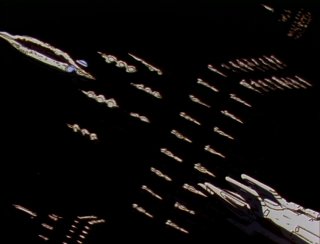
The SEEDS Fleet
The sixth disc started with an episode that had this image of a fleet of starships. I momentarily thought that I screwed up my Netflix queue, putting Banner of the Stars II ahead of Trigun, but it turns out that this image begins a lengthy flashback that describes Vash's past and how the planet was colonized. I was a little disappointed that I wasn't watching Banner II, which just goes to show that I didn't like Trigun much.
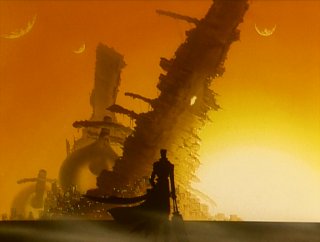
I just really like this visual, though it's indicative of what I don't like about the series' overuse of panning on still shots.
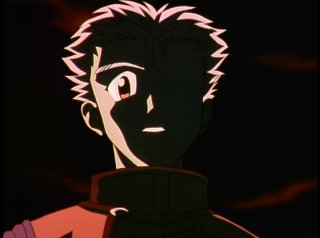
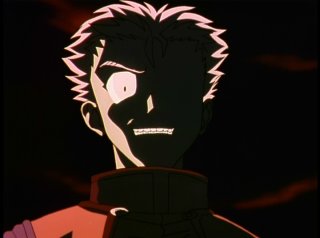
On the other hand, this series of two shots shows how effectively human emotion is communicated through a couple of simple (ok, exaggerated) changes to facial expressions. Still, the continual use of cheap animation techniques was somewhat grating to me.
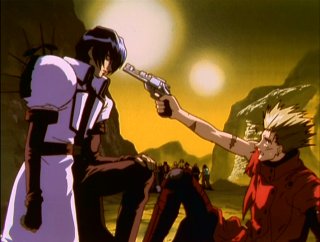
Legato vs Vash
I loved this shot of Legato's final showdown with Vash. Major spoilers! In the showdown, Legato's real purpose is not to physically defeat Vash. Rather, Legato seeks to force Vash to break one of his own rules. Vash has sworn to never take a life, so Legato set up this situation in which the only way for Vash to survive would be to shoot Legato. The reason the shot is brilliant is that Legato is higher in the frame, towering over Vash. This position is usually a sign of strength, and thematically, Legato does indeed have the upper hand in this situation, despite the fact that he is unarmed and Vash is pointing a gun at his head. I found this bit of visual dissonance rather clever, but unfortunately, the next couple of shots ruin it by having Vash stand up and showing Vash from a low "camera" angle (which visually ephasises Vash's power, despite the fact that Vash is actually succumbing to weakness).
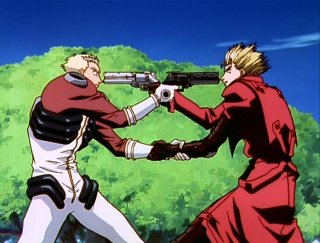
Knives vs Vash
Unfortunately, Vash's showdown with Knives is not as visually interesting and is indeed anticlimatic. The battle takes maybe 5-10 minutes of screen time, but I was distinctly reminded of the pointless fight sequences in the Matrix sequels.
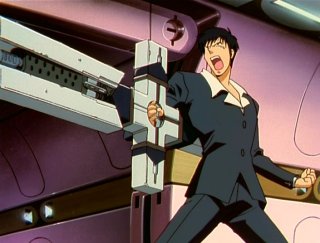
Wolfwood's Big Gun
At some point during the last 10 episodes, you see the full power of the cross that Wolfwood carries around. I'm not positive, but I'm pretty sure they only animated this one pose of Wolfwood holding his weapon, and then changed the backgrounds on at least 2 or three separate episodes.
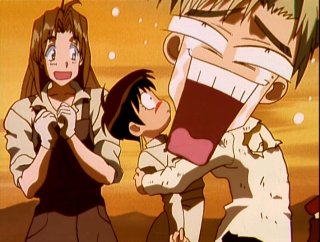
Big Smile!
Though it is curtailed in the last 10 episodes, the absurdly stylized art is still present.
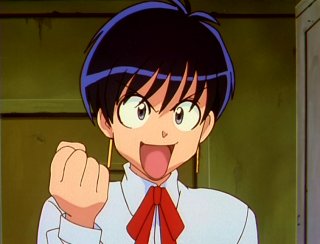
Meryl
And I shall leave you with one more pic of Meryl, because, well, because I want to. It's a good pic, right?
That does it for Trigun. Again, not positive what Anime I'll be watching next, but it'll probably be Noir or Samurai 7.
Author
I reviewed your archives briefly and the old recommendations post from March 11, 2007, and sadly we almost have no common ground at all. I'm majorly into sunny and happy things, like Rocket Girls. I still think things like Memories and Millenium Actress should work for you. The 08th MS Team that Roy recommended is a good call IMHO -- despite him hoisting Trigun on you -- but 08th was impossible to get off Netflix even back in my time (eventually I gave up and watched about a third of it on fansubs). And from there, you're on your own.
Mark
I'm not especially opposed to sunny and happy things, but I did limit my choices to actiony type stuff because I like that. I've got plenty of series to choose from, and while I don't think I'll ever reach the depth of most anime-bloggers (Like you or Steven), I'll probably still keep watching various series.
Takashi C
first off, as an artist i feel you didnt give this the credit it deserved.
not to be rude, but this anime did it's job, even though, there were some episodes i skipped due to fluff (aka filler). but it did have some positive points, the animation was true to the artist, I really dont see much difference between the manga and the televised version. the dubbing on major characters wasnt akward like in the Japanese (wolfwood sounds way too young). Though it was funny at some points, it had some seriousness, including wolfwood's death (i found it very touching. The villains weren't stupid or wacky (besides the first one, he did look silly) they were villains. I can't change your opinion but I do feel you were a bit harsh, even for criticism, you need to know what to say, because frankly, if i was the artist, or frankly, anyone who watches this would (pardon my rudeness) punch you in the face for your ignorance. To end on a better note, yes, the series could use some work, and atleast it isnt a copy of another popular series like rorouni kenshin (besides casting Johnny Yong Bosch).
Mark
If I was harsh, it was because I really did not enjoy the series and when I looked back, I realized that I had spent 10 hours watching the damn thing. Re-reading the review, I actually thought I was somewhat forgiving. I have to admit, I'm a bit baffled by the notion that artists would be offended by my comments. From a visual standpoint, the art and design is fine, impressive even. My big complaint was with the story, steampunk setting, and the animation - the way the art comes to life. The series is filled with tricks of the trade in animation. Normally, this sort of detail wouldn't bother me, but again, I never connected with the story of the series, so the combination of everything really wore me down.